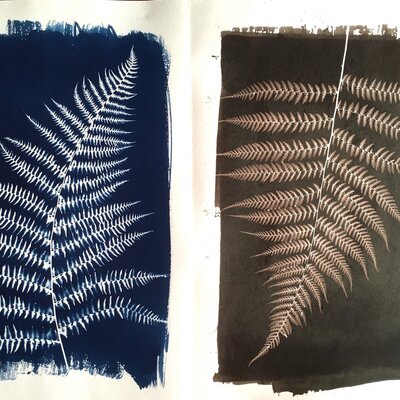Many of us respond powerfully to the landscape, especially when as beautiful as at West Dean; its varied moods, spaces and associations inspire us. However, the extraordinary variety of natures weather and lights change as we look. Monotype offers a means to record rapidly, then elaborate and interpret our responses. There is a rich tradition of artist printmakers who have articulated this love of a specific place through their graphic works. Looking carefully at the prints of John Sell Cotman, Edgar Degas, Pablo Picasso, Eileen Agar, Prunella Clough and Howard Hodgkin, we will learn from their formal printmaking techniques and the more emotional range of intentions.
By exploring the contrasting processes available in monotype, we will benefit from their complementary approaches. Monotype can be a particularly intuitive medium painterly and immediate, producing a unique image. However, there are always traces left on the plate that enable the artist to rework the image rapidly and produce variants which can evolve to offer a shifting expression of visual concerns. You will be exploring a wide range of procedures, from direct observation (taking your plates outside) to combining two plates in offset printing to achieve multicoloured overprint. The spontaneous response which monoprinting demands is normally extremely direct, but if we introduce strategies with stencils and collage, the complexity of the image increases. The reworking of prints through collage with transparent layers and watercolour will turn monotype into an even more exciting experimental medium.
The structure of the course will follow a programme of the group being introduced to a specific technique in the morning session and then, as your tutor gets to know your specific needs, the afternoons will be a less structured exploration of your own directions. The final review session is important in terms of tutorial overview, with a detailed analysis of the weeks work and suggestions as to how you could progress after the course.
Included
Included in the fee for this course are:
- Water-based ink
- Three sheets of printing paper
- Tissue paper
- PVA
What students need to bring
- Water containers
- Messy printing clothes, overalls or an apron
- If possible, research the medium of monotype, Pablo Picasso and Edgar Degas. If you are a beginner, try drawing from a local landscape, capturing what is important about it for you.
- Sketchbooks
- Pencils: HB, 2B, 4B, 6B
- Various papers for printing on, tracing paper, carbon paper, white tissue paper
- Brushes (for water based inks)
- PVA glue
- Clear tissue paper as used for wrapping china, etc. - 10 sheets
- Set of colours to rework prints with possibly, including, if you have them, oil pastels/chalk pastels/colured pencils
- Nori paste rice glue (Yamato is your tutors favourite brand but cheaper options just called Nori are available on the Internet) - this is a paste (not a wet PVA) and better when working with tissue paper
Available to buy
Available from shop:
A good variety of art materials, including sketchbooks, pencils: HB, 2B, 4B, 6B, various papers for printing on, tracing paper, carbon paper, tissue paper, brushes (for water-based inks) and PVA glue
Additional information
Please wear appropriate clothing/aprons for the workshop or studio. This includes stout covered footwear, i.e. no open-toes or sandals.
Arrival day
Residential students can arrive from 4pm, non-residential students to arrive by 7.15pm for registration. Students arriving earlier are welcome to purchase dinner in the College Dining Room from 6pm.
Students meet their tutor in the Bar at 7.30pm prompt to go to studios.
First Teaching session: 7.30pm - 9pm (attendance is essential)
Daily timetable
Course teaching: 9.15am - 5pm
Morning session: 9.15am - 12.45pm including coffee/tea break
Lunch break: 12.45pm - 2pm*
Afternoon session: 2pm - 5pm including coffee/tea break
Teaching finishes: 5pm
Evening working: students may have access to workshops until 9pm, but only with permission from the tutor and provided any health and safety guidelines are observed.
Departure day
Course teaching: 9.15am - 3pm
Teaching finishes: 3pm
Residential students will need to check out of rooms by 10am.
Please note, the tutor may make slight variations to the daily timetable as required.
*Lunch can be purchased on campus, view options





